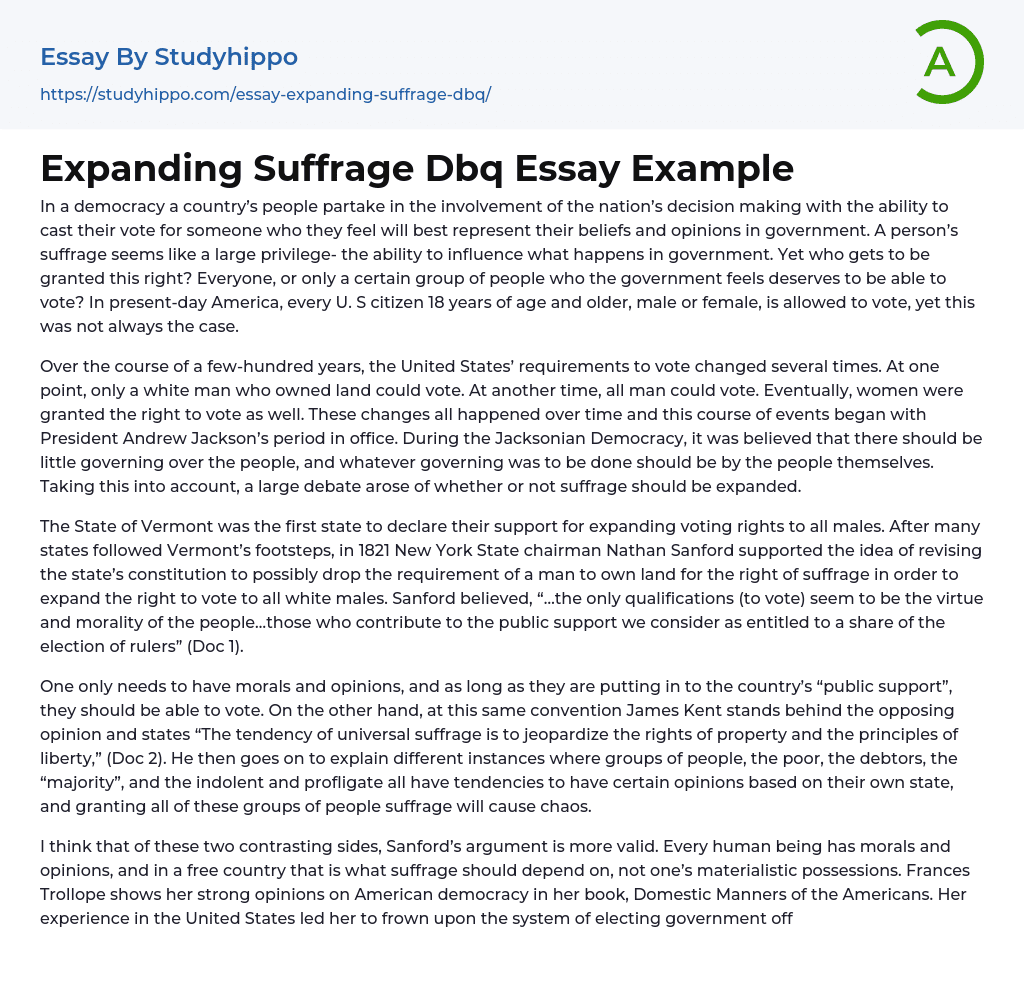In a democracy a country’s people partake in the involvement of the nation’s decision making with the ability to cast their vote for someone who they feel will best represent their beliefs and opinions in government. A person’s suffrage seems like a large privilege- the ability to influence what happens in government. Yet who gets to be granted this right? Everyone, or only a certain group of people who the government feels deserves to be able to vote? In present-day America, every U. S citizen 18 years of age and older, male or female, is allowed to vote, yet this was not always the case.
Over the course of a few-hundred years, the United States’ requirements to vote changed several times. At one point, only a white man who owned land could vote. At another time,
...all man could vote. Eventually, women were granted the right to vote as well. These changes all happened over time and this course of events began with President Andrew Jackson’s period in office. During the Jacksonian Democracy, it was believed that there should be little governing over the people, and whatever governing was to be done should be by the people themselves. Taking this into account, a large debate arose of whether or not suffrage should be expanded.
The State of Vermont was the first state to declare their support for expanding voting rights to all males. After many states followed Vermont’s footsteps, in 1821 New York State chairman Nathan Sanford supported the idea of revising the state’s constitution to possibly drop the requirement of a man to own land for the right of suffrag
in order to expand the right to vote to all white males. Sanford believed, “…the only qualifications (to vote) seem to be the virtue and morality of the people…those who contribute to the public support we consider as entitled to a share of the election of rulers” (Doc 1).
One only needs to have morals and opinions, and as long as they are putting in to the country’s “public support”, they should be able to vote. On the other hand, at this same convention James Kent stands behind the opposing opinion and states “The tendency of universal suffrage is to jeopardize the rights of property and the principles of liberty,” (Doc 2). He then goes on to explain different instances where groups of people, the poor, the debtors, the “majority”, and the indolent and profligate all have tendencies to have certain opinions based on their own state, and granting all of these groups of people suffrage will cause chaos.
I think that of these two contrasting sides, Sanford’s argument is more valid. Every human being has morals and opinions, and in a free country that is what suffrage should depend on, not one’s materialistic possessions. Frances Trollope shows her strong opinions on American democracy in her book, Domestic Manners of the Americans. Her experience in the United States led her to frown upon the system of electing government officials, and American politics in general.
Trollope said, “They are all ready to peck out the eyes of those who oppose them” which shows that she feels the American government is very competitive in negative aspects (Doc 4). Taking al of this into account,
it is clear that she would not have been pro expanding American suffrage. On the contrary, George Bancroft strongly believed in suffrage for all, which is very easily understood from portion of his speech given at Williams College: “…the best government rests on the people and not on the few, on person and not on property, on the free development of public opinion and not on authority…” (Doc 5).
Bancroft was another strong believer that government was based on the people themselves and not what they owned, therefore expanding suffrage was the best thing a country could do for itself. Lastly, in the painting “The County Election”, George Caleb depicts men dressed well as well as some poorly dressed, showing various social classes all at the same election (Doc 6) This unifies all men voting together at the county election which is what Caleb’s interpretation of an expansion of suffrage looks like.
Out of all of the arguments, the people who agreed that every man deserved the right to vote had the most compelling and true arguments. It is fact that what you have doesn’t make up who you are, or what you believe in, so when it comes to using your beliefs and ideas to vote for a president, why should it be that only land-owning males have this right? It shouldn’t. This idea was also supported by many western states who felt that land was so easily obtained that it meant nothing as being a qualification for voting rights. The answer is that expanding voting privileges to all people is the correct thing to do in a democracy.
- Values of Life essays
- Ethical dilemma essays
- Normative Ethics essays
- Virtue Ethics essays
- Belief essays
- Deontology essays
- Moral essays
- Virtue essays
- Work Ethic essays
- Absolutism essays
- Appeal essays
- Bourgeoisie essays
- Contras essays
- Corporate Governance essays
- Corruption essays
- Democracy essays
- Democratic Party essays
- Developed Country essays
- Dictatorship essays
- Elections essays
- European Union essays
- Federalism essays
- Foreign essays
- Foreign policy essays
- Gentrification essays
- Hillary Clinton essays
- Income Tax essays
- International Relations essays
- John Marshall essays
- John Stuart Mill essays
- Left-Wing Politics essays
- Liberty essays
- Military essays
- Monarch essays
- Monarchy essays
- Political Corruption essays
- Political Party essays
- Political Science essays
- President Of The United States essays
- Public Service essays
- Red Cross essays
- Reform essays
- Republic essays
- Revenge essays
- Social Security essays
- Sovereign State essays
- State essays
- Supply essays
- Terrorism essays
- United Nations essays




